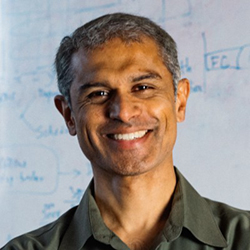BEARS 2021: Hari Balakrishnan
Computer Science Distinguished Alumnus - Academia
For leadership in research of networked computer systems that reach out to the physical world and span the globe, and for applications including products to improve transportation safety.

Hari Balakrishnan
Ph.D. 1998 (advisor: Randy Katz)
Fujitsu Professor of Computer Science and Artificial Intelligence at MIT, Founder and CTO of Cambridge Mobile Telematics
Hari Balakrishnan earned a B. Tech in Computer Science and Engineering from the Indian Institute of Technology in Madras before coming to Berkeley as a graduate student. His thesis topic was TCP over heterogeneous wireless networks, including the TCP Snoop Protocol and algorithms for improving TCP performance over asymmetric and packet radio networks. He made TCP improvements for small window connections, including a scheme called “enhanced recovery” (now known as “limited transmit”) which is currently implemented in most TCP stacks. He received a best student paper award at both the MobiCom and USENIX conferences, and won the 1998 ACM doctoral dissertation award.
After graduation, Balakrishnan was hired as a professor at MIT and worked as a consultant at Sandburst for three years. At MIT, his research included the development of the Cricket indoor location system between 1999 and 2004, which showed how to use radio and ultrasonic technologies to accurately estimate positions indoors to within a few centimeters. The open-source hardware and software from Cricket was commercialized by multiple companies, and the project won a “test of time” paper award from SIGMOBILE. Between 1999 and 2004, he also co-invented distributed hash tables with his contributions to the Chord protocol, which later won multiple “test of time” awards, and showed how overlay networks could improve Internet reliability in the RON project. He has also made many contributions to Internet and datacenter congestion control.
In 2004, he began the CarTel project at MIT with Sam Madden, where they developed a mobile sensing system to collect and draw inferences from sensor data on mobile devices. They subsequently partnered with Boston taxi companies to accurately measure traffic and road surface conditions using new methods combining mobile sensing and machine learning. This project also won several “best paper” and “test of time” awards.
Balakrishnan and Madden joined with Bill Powers to found Cambridge Mobile Telematics (CMT) in 2010. CMT deployed the first mobile usage-based insurance (UBI) with smartphones in 2012, the first measurement of phone distraction using smartphone sensors in 2013, a novel windshield-mounted hardware Tag to augment smartphone sensors in 2014, and real-time crash alerts with roadside assistance in 2015. CMT’s products include DriveWell, a telematics and analytics platform for measuring driving quality and incentivizing safe driving, and Claims Studio, which provides real-time crash detection and accurate crash reconstruction data for insurance claims. CMT is now the world’s leading and largest mobile telematics provider, supporting 65 enterprise programs in 25 countries, with over 6.5 million users of its services.
Balakrishnan was inducted to the National Academy of Engineering in 2015 and the American Academy of Arts and Sciences in 2017, and received the Infosys Prize in 2020 and the IEEE Koji Kobayashi Award for Computers and Communication in 2021 for his important contributions to networks, mobile systems, and telematics. He is also a Fellow of both the ACM and IEEE.